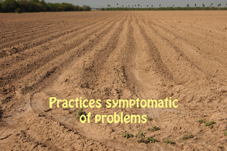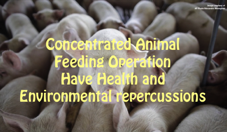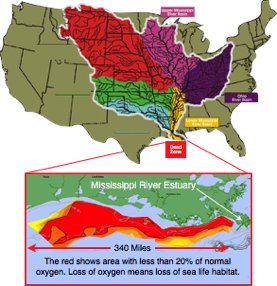The Problems
“Industrial food production, which currently dominates U.S. agriculture, is a dead end. It damages air, water and soil, harms rural communities, and limits future productivity.”
—Union of Concerned Scientists
The United States is in crisis. The health of our soil resource has declined to such a point that it is not only negatively affecting farm and ranch profitability, but it is also having a devastating impact on everything from our water quality to our communities and even to our health.
—North Dakota rancher Gabe Brown
The Solutions are
described in different terms but all
define paths to future sustainable farming.
To learn more, follow the links
fromwhere the definitions are taken
“…there's a better way. Scientists call it agro-ecological agriculture. We call it healthy farms. Healthy farms can be just as productive as industrial farms—and a lot more sustainable.”
—Union of Concerned Scientists
Agroecologist—a farmer who applies
ecological processes to agricultural production. The acroecologist use natural sciences to understand elements of agroecosystems such as soil properties and plant-insect interactions, as well as using social sciences to understand the effects of farming practices on rural communities, economic constraints to developing new production methods, or cultural factors determining farming practices.
—From https://en.wikipedia.org/wiki/Agroecology
An important feature of agroecology is its lack of dependency on petrochemicals and oil in the cultivation of plants.
Agroecology also promotes more efficient and less depleting uses of water and land than industrial agriculture. Soil ecosystems are better preserved.
The principles of agroecology also add to the aesthetics and health of human environments.
—From http://www.scienceofagroecology.info/index.html
Farming using “Nature’s Way” is a term coined by the very successful North Dakota Farmer, Gabe Brown. Watch this 20 minute TEDx video to learn how he improved productivity and profitability by dramatically changing his farming practices. Gabe Brown is one of the pioneers of the current soil health movement that focuses on regenerating our resources. Gabe, along with his wife, Shelly, and son, Paul, own and operate a diversified 5,000-acre farm and ranch near Bismarck, ND. Their operation focuses on farming and ranching in nature’s image.
Regenerative Agriculture is a holistic land management practice that leverages the power of photosynthesis in plants to close the carbon cycle, and build soil health, crop resilience and nutrient density.



The Gulf of Mexico’s dead zone is caused by humans. These areas are preventable.
The nutrients these algal blooms feed on come from synthetic fertilizers and animal manure, human and industrial waste.
The solution is to change agricultural practices. Practical? Yes! There are lots of excellent examples with farmers with up to 10,000 acres who operate without external inputs, meaning no chemical inputs.

The science of agroecology can make American farming more sustainable. So why are we investing so little in it? Read this article!
Here is a link to an Infographic prepared by the Union of Concerned Scientist. In a graphic way it provides ann insights into the make-up of a
Research finds grazing cover crops saves money and improves soil health
Between 2014 and 2018, the Wallace Center’s Pasture Project initiative worked in partnership with Practical Farmers of Iowa (PFI), Sustainable Farming Association (SFA) and Land Stewardship Project (LSP) to assess and promote the economic and soil health benefits of grazing diverse cover crops with cattle under adaptive, high-stock density management.
The project worked with eight farms in Minnesota and Iowa—including two PFI member farms—to gather date, offer field days, and create farmer-focused resources on grazing cover crops.
Read more about the Research here.
Read about Practical Farmers of Iowa here.
Read about Sustainable Farming Association here.
Read about Land Stewardship Project here.
